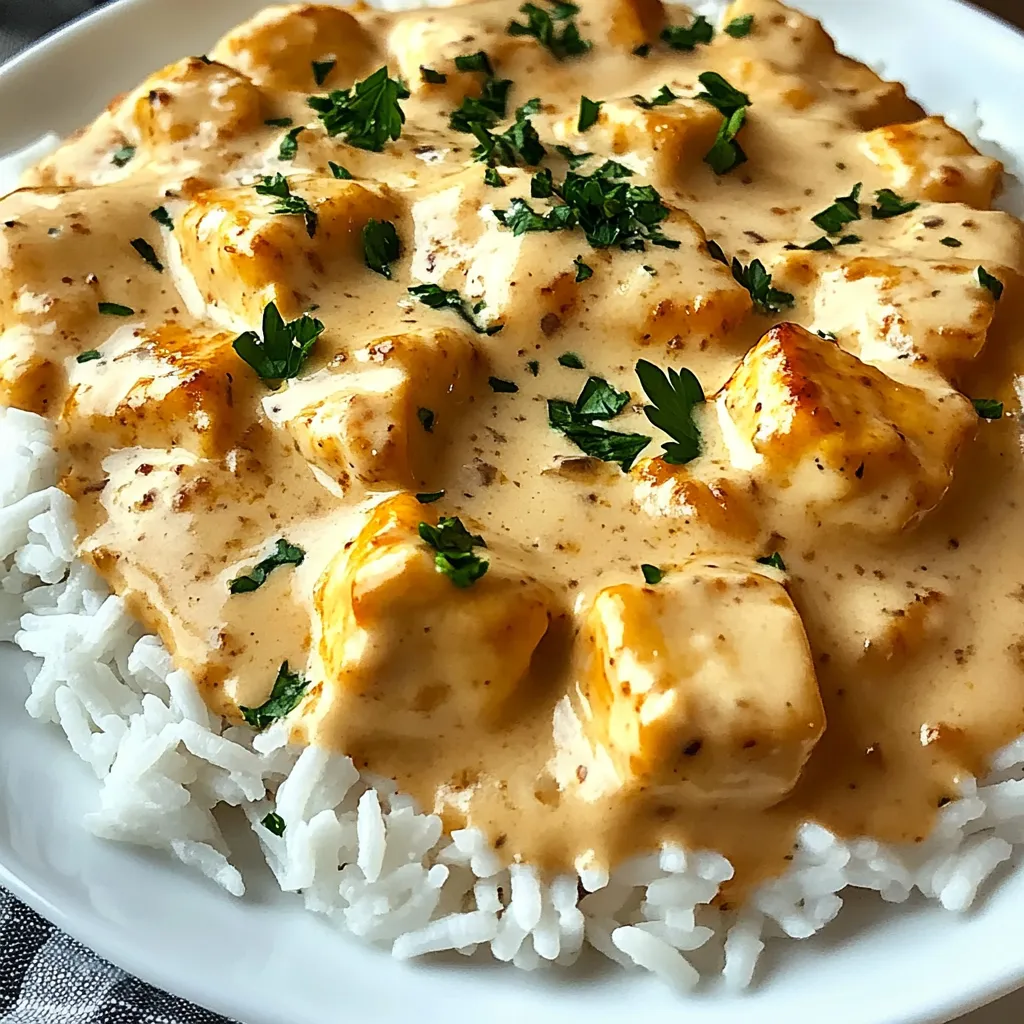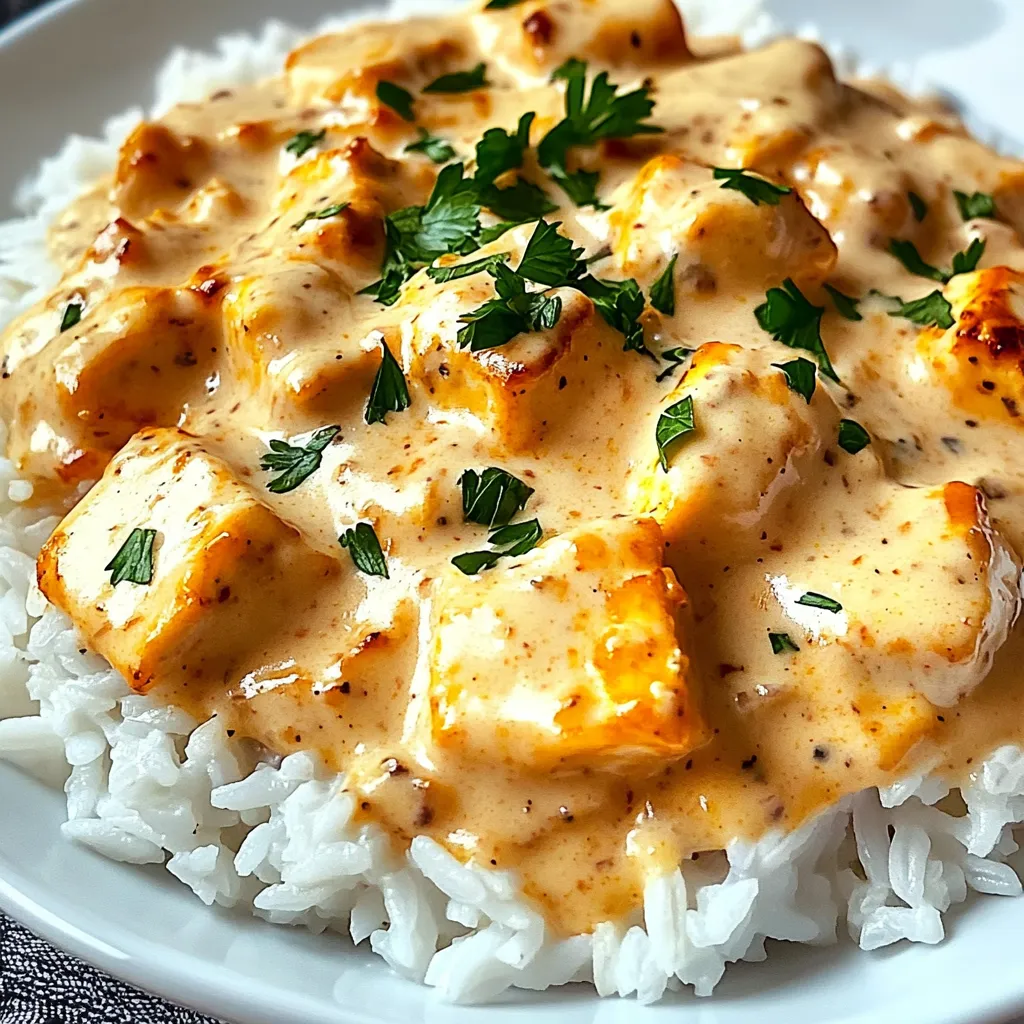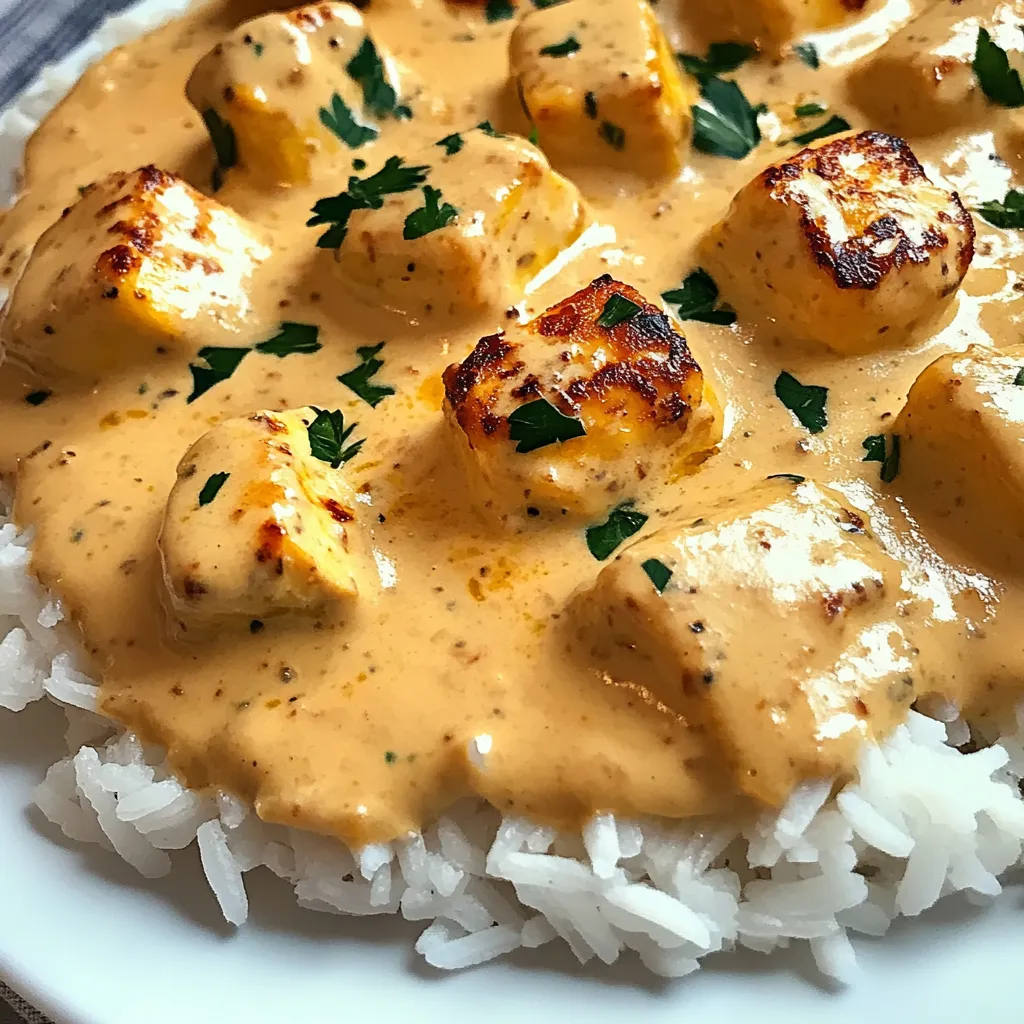 Pin it
Pin it
Velvety cheese sauce blankets perfectly seasoned chicken in this soul-warming Southern classic. This smothered chicken transforms ordinary ingredients into extraordinary comfort food, creating an irresistible harmony of flavors and textures. The tender chicken breasts, infused with smoky seasonings, nestle into a rich, cheesy sauce that coats every grain of fluffy rice beneath. Each forkful delivers that perfect combination of protein, starch, and creamy indulgence that defines true comfort cuisine.
The first time I made this smothered chicken, my normally talkative husband fell completely silent during dinner, only pausing between bites to murmur appreciative sounds. My picky teenage son, who typically pushes creamy sauces aside, asked for seconds and then requested it again the following night. Something about the combination of smoky-seasoned chicken with that velvety cheese sauce creates an almost magical dining experience that transforms ordinary weeknight dinners into something truly special.
Perfect Ingredients
- Boneless chicken breasts: Form the hearty protein foundation of this dish. Look for uniformly sized pieces around 6-8 ounces each for even cooking.
- Garlic powder: Infuses the chicken with aromatic depth without burning like fresh garlic can during searing. Always check expiration date as potency diminishes over time.
- Smoked paprika: Adds distinctive smoky dimension that elevates simple chicken breasts. Spanish varieties offer more complex flavor than standard paprika.
- Long-grain white rice: Creates the perfect fluffy base for absorbing sauce. Jasmine or basmati varieties add subtle fragrance that complements the creamy sauce beautifully.
- Chicken broth: Infuses both rice and sauce with savory richness. Homemade delivers superior flavor, though quality store-bought works wonderfully.
- Unsalted butter: Forms the crucial base of your roux for thickening sauce. European-style butter with higher fat content creates exceptional richness.
- All-purpose flour: Works with butter to create the perfect thickening foundation. Measure precisely as too much creates pasty texture while too little results in thin sauce.
- Whole milk: Provides creamy body to your sauce without excessive richness. The fat content is essential for proper sauce texture and preventing separation.
- Cheddar cheese: Delivers sharp, tangy notes and beautiful color to the sauce. Freshly grated melts significantly better than pre-shredded with anti-caking additives.
- Parmesan cheese: Adds complex umami depth and slight nuttiness to the sauce. Authentic Parmigiano-Reggiano provides superior flavor compared to domestic versions.
Cooking Magic
- Perfect Preparation:
- Begin by thoroughly drying chicken breasts with paper towels before seasoning—this seemingly small step ensures proper browning rather than steaming. Create a flavorful seasoning blend by combining garlic powder, onion powder, smoked paprika, salt, and pepper, then apply generously to all sides. Allow the seasoned chicken to rest briefly at room temperature while preparing other components, which promotes even cooking and flavor absorption.
- Searing Technique:
- Heat olive oil in a heavy skillet until shimmering but not smoking—this optimal temperature creates beautiful golden crust without burning. Place chicken carefully away from yourself to prevent oil splatters, then resist the urge to move pieces prematurely. Proper searing requires patience; the chicken will naturally release from the pan when adequately browned, typically after 4-5 minutes. Flip once with tongs rather than forks to prevent precious juice loss.
- Rice Perfection:
- Bring broth to a full, vigorous boil before adding rice—this initial high heat helps prevent stickiness. Once rice is added, reduce heat immediately to maintain the gentlest possible simmer. Keep the lid tightly sealed throughout cooking, avoiding the temptation to peek or stir, which releases essential steam and disturbs starch development. After cooking, allow rice to rest covered for five minutes before fluffing with a fork, using a gentle lifting motion rather than stirring.
- Sauce Creation:
- Begin the sauce in the same skillet used for chicken, taking advantage of flavorful browned bits left behind. Melt butter completely before sprinkling flour over it, then whisk continuously during the crucial first minute when flour taste cooks out. Add liquids in a slow, steady stream while whisking vigorously to prevent lumps from forming. Maintain a gentle simmer rather than boiling, which can break the sauce's emulsion and create graininess.
- Cheese Incorporation:
- Reduce heat to low before adding cheese to prevent separation and graininess. Add cheese in small handfuls rather than all at once, allowing each addition to melt completely before adding more. Stir with a wooden spoon using a figure-eight motion to incorporate thoroughly without cooling the sauce too quickly. The finished sauce should coat the back of a spoon while remaining pourable rather than pasty.
- Final Assembly:
- Return chicken to the sauce with any accumulated juices, which add valuable flavor. Spoon sauce over chicken repeatedly to create a flavor-infused coating. Cover and simmer gently until chicken reaches proper temperature—165°F at the thickest point—while remaining juicy. Always rest chicken briefly before serving, allowing juices to redistribute throughout the meat for maximum tenderness.
 Pin it
Pin it
My grandmother made smothered chicken frequently, though her version used bone-in chicken and gravy rather than cheese sauce. The first time I attempted updating her recipe with cheese, I added it to boiling sauce and ended up with a grainy, separated mess. I've since learned that gentle heat and patience make all the difference when incorporating cheese. The modern version has become my family's most requested comfort meal, especially during colder months when we crave something substantial and warming. My father-in-law, typically sparing with compliments, declared it 'restaurant quality' after his first bite.
Perfect Pairings
Elevate your smothered chicken experience by serving with roasted asparagus spears drizzled with lemon butter for bright contrast to the creamy richness. Consider offering buttery yeast rolls alongside for soaking up every drop of the remarkable sauce. For colorful visual appeal, fresh green beans almondine provide textural crunch while complementing the dish's richness. Wine enthusiasts appreciate how an oaked Chardonnay balances the creamy elements beautifully with its subtle buttery notes. For family-style serving, place chicken and sauce directly atop a large platter of rice surrounded by roasted seasonal vegetables.
Flavor Variations
Transform this classic by incorporating sautéed mushrooms into the sauce for earthy complexity that complements the cheese beautifully. Create Cajun-inspired kick by adding blackening seasonings to chicken and incorporating diced bell peppers into the sauce. For Mediterranean flair, substitute feta and Parmesan for cheddar while adding olives and sun-dried tomatoes to the finished dish. Create elegant presentation by butterflying thicker chicken breasts before cooking, which shortens cooking time while providing greater surface area for sauce. Consider bacon addition by rendering chopped bacon before searing chicken, then incorporating crispy pieces into the finished sauce.
Storage Success
Maintain perfect texture by storing chicken and sauce separately from rice in airtight containers in the refrigerator for up to three days. Reheat chicken and sauce gently in a covered skillet over low heat, adding a splash of milk to restore creamy consistency. For make-ahead convenience, prepare components separately up to two days before serving—rice reheats beautifully with two tablespoons of water per cup in a covered microwave-safe dish. Freeze unassembled components individually for up to two months, thawing overnight in the refrigerator before gentle reheating. Always bring refrigerated leftovers to room temperature for 15 minutes before heating for more even warming.
My early attempts at this recipe taught me several valuable lessons about patience and technique. When I rushed the searing process with too-cold chicken and insufficiently heated oil, I created pale, rubbery meat instead of beautifully browned, tender chicken. Similarly, when I rushed sauce-making by adding liquids too quickly to my roux, I created lumpy sauce requiring straining. Now I approach each step methodically, allowing proper heating time for skillets, proper browning time for chicken, and proper thickening time for sauce. These simple adjustments transformed good smothered chicken into exceptional smothered chicken—proving that sometimes the most important cooking technique is simply slowing down.
 Pin it
Pin it
Frequently Asked Questions
- → Can I use chicken thighs instead of breasts?
- Yes, chicken thighs will work well in this recipe.
- → Can I make the sauce ahead of time?
- Yes, you can make the sauce ahead of time and store it in the refrigerator.
- → Can I freeze the leftovers?
- Yes, you can freeze the leftovers in an airtight container for up to 3 months.
- → Can I use a different type of cheese?
- Yes, you can experiment with different types of cheese like Gouda or mozzarella.
- → How should I store the leftovers?
- Store the leftovers in an airtight container in the refrigerator for up to 3 days.
